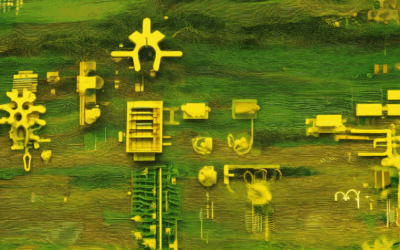In today’s rapidly evolving digital landscape, staying ahead of the curve requires a deep understanding of the latest new technology insights. As we navigate the complexities of emerging technologies, it’s essential to grasp the meaning of technology insight and how it drives innovation and growth in businesses. From exploring the cutting-edge advancements in artificial intelligence and machine learning to examining the potential benefits and risks of emerging technologies, this article delves into the top trends and emerging technologies of 2024. By unlocking new technology insights, we can better prepare for the future and adapt to the changing technological landscape.

Understanding Technology Insight
Technology insight refers to the novel and innovative applications of technology that businesses discover through systematic data analysis.
- These insights enable companies to gain a competitive advantage, identify unmet market needs, validate strategic decisions, and ultimately drive business innovation and success.
- By leveraging technology insights, organizations can stay ahead of the curve, adapt to changing market conditions, and capitalize on emerging opportunities.
- Moreover, technology insights can help businesses optimize their operations, enhance customer experiences, and improve overall efficiency.
Key Characteristics of Technology Insights
- Innovation**: Technology insights often involve the development of new products, services, or processes that leverage emerging technologies.
- Data-driven decision-making**: Businesses use data analytics and machine learning algorithms to uncover hidden patterns and correlations that inform strategic decisions.
- Competitive advantage**: Technology insights enable companies to differentiate themselves from competitors, establish a unique value proposition, and attract loyal customers.
- Continuous learning**: Organizations that cultivate a culture of continuous learning and experimentation are better positioned to harness the power of technology insights.
Benefits of Embracing Technology Insights
- Improved competitiveness**: By staying ahead of the curve, businesses can outmaneuver competitors and capture market share.
- Increased revenue growth**: Technology insights can lead to the development of new revenue streams, improved pricing power, and enhanced profitability.
- Enhanced customer satisfaction**: Businesses that leverage technology insights can deliver personalized experiences, improve operational efficiency, and reduce costs.
- Strategic agility**: Organizations that cultivate a culture of innovation and experimentation can respond quickly to changing market conditions and capitalize on emerging opportunities.
Best Practices for Harnessing Technology Insights
- Cultivate a culture of innovation**: Encourage experimentation, risk-taking, and continuous learning within your organization.
- Invest in data analytics and machine learning**: Leverage these tools to uncover hidden patterns and correlations that inform strategic decisions.
- Stay up-to-date with emerging technologies**: Continuously monitor industry trends, attend conferences, and participate in online forums to stay informed.
- Foster partnerships and collaborations**: Collaborate with other businesses, academia, and research institutions to access new ideas, expertise, and resources.
The Latest New Technology
We’re living in an era of rapid technological advancement, and it can be challenging to keep up with the latest innovations.
- Artificial Intelligence (AI): AI continues to transform industries, from healthcare to finance, with its ability to analyze vast amounts of data and learn from experiences.
- Internet of Things (IoT): As IoT devices become increasingly prevalent, we’re seeing new applications emerge, such as smart homes and cities, which aim to improve efficiency and sustainability.
- Cryptocurrency and Blockchain: Cryptocurrencies like Bitcoin and Ethereum have gained significant attention, while blockchain technology has the potential to revolutionize supply chain management and secure data storage.
- Quantum Computing: Quantum computing holds promise for solving complex problems in fields like medicine and climate modeling, offering unprecedented processing power and speed.
- Extended Reality (XR): XR encompasses virtual reality (VR), augmented reality (AR), and mixed reality (MR), transforming entertainment, education, and communication.
- 5G Networks: The rollout of 5G networks enables faster data transfer rates, lower latency, and greater connectivity, paving the way for widespread adoption of IoT devices and immersive technologies.
- Sustainable Energy Solutions: Innovations in renewable energy, such as solar panels and wind turbines, are becoming increasingly cost-effective and efficient, driving the transition towards a greener future.
- Biotechnology and Gene Editing: Advances in biotechnology and gene editing tools like CRISPR/Cas9 are opening doors to new treatments for genetic diseases and potentially even regenerative medicine.
- Autonomous Vehicles: Self-driving cars and drones are being developed to enhance safety, reduce traffic congestion, and increase mobility for the elderly and disabled.
- Advanced Materials Science: Researchers are discovering new materials with unique properties, such as superconductors and nanomaterials, which could lead to breakthroughs in fields like energy storage and medical devices.
These emerging technologies hold immense potential for transforming various aspects of our lives, from healthcare and transportation to energy and communication.

Trending Technologies in 2024
We’re living in an era of rapid technological advancement, and 2024 is shaping up to be a pivotal year for innovation.
-
Artificial Intelligence and Machine Learning
The integration of AI and ML continues to revolutionize industries, from healthcare to finance, and is expected to play a crucial role in shaping the future of work.
- Advancements in natural language processing (NLP) and computer vision are enabling machines to learn and adapt at an unprecedented rate.
- The rise of explainable AI (XAI) is addressing concerns around transparency and accountability in decision-making processes.
- ML-based predictive analytics is becoming increasingly sophisticated, allowing businesses to make data-driven decisions with greater accuracy.
Extended Reality (XR)
XR, encompassing virtual reality (VR), augmented reality (AR), and mixed reality (MR), is poised to transform entertainment, education, and commerce.
- VR is gaining traction in gaming, film, and therapy applications, offering immersive experiences that blur the lines between reality and fantasy.
- AR is being adopted in retail, marketing, and education, enhancing customer engagement and interactive learning experiences.
- MR is emerging as a key player in fields like architecture, engineering, and product design, enabling creators to prototype and visualize complex ideas.
Cybersecurity
As technology advances, cybersecurity threats are evolving, making it essential for businesses and individuals to stay vigilant.
- Ransomware attacks are on the rise, highlighting the need for robust backup systems and incident response plans.
- Zero-trust architectures are gaining popularity, emphasizing the importance of verifying identities and access controls.
- Quantum computing is being explored for its potential to crack encryption codes, prompting a shift towards post-quantum cryptography.
Internet of Things (IoT)
The IoT is expanding rapidly, connecting devices, sensors, and systems to create smarter cities, homes, and workplaces.
- Smart home automation is becoming increasingly popular, with voice assistants and mobile apps controlling lighting, temperature, and security systems.
- Industrial IoT (IIoT) is driving efficiency gains in manufacturing, logistics, and supply chain management.
- Wearables and health monitoring devices are revolutionizing personal healthcare, enabling early detection and prevention of chronic diseases.
Blockchain and Cryptocurrency
Blockchain technology is being applied beyond cryptocurrency, with potential uses in supply chain management, voting systems, and identity verification.
- Decentralized finance (DeFi) platforms are emerging, offering alternative lending models and financial instruments.
- Non-fungible tokens (NFTs) are gaining traction in art, collectibles, and digital ownership.
- Central bank digital currencies (CBDCs) are being explored as a means of promoting financial inclusion and reducing transaction costs.
These technologies are just a few examples of the many exciting developments happening in 2024. As we move forward, it’s essential to stay informed and adaptable, embracing the opportunities and challenges that come with technological progress.

Impact of Top 10 Emerging Technologies of 2024
The year 2024 has brought forth numerous groundbreaking technologies that will significantly shape our world.
-
Artificial Intelligence Systems for Scientific Research
AI systems have revolutionized the field of scientific research, enabling scientists to analyze vast amounts of data and identify patterns that would have gone unnoticed before.
- Machine learning algorithms can now predict complex phenomena, such as climate models and disease outbreaks.
- AI-assisted research has led to breakthroughs in fields like medicine, astronomy, and materials science.
-
Immersive Urban Design Tools
Immersive technologies like virtual reality and augmented reality are transforming the way we design and interact with cities.
- Urban planners can now create immersive experiences that simulate the impact of different design choices on city infrastructure and residents.
- These tools enable citizens to participate in the planning process, fostering a sense of community and ownership.
-
Quantum Computing
Quantum computers have the potential to solve complex problems that are currently unsolvable with traditional computers.
- They can simulate complex systems, optimize processes, and crack encryption codes.
- Quantum computing will revolutionize fields like cryptography, logistics, and financial modeling.
-
Sustainable Technologies
Sustainable technologies like carbon-capturing microbes and next-generation genomics are crucial for mitigating climate change.
- Carbon-capturing microbes can convert CO2 into oxygen, reducing greenhouse gas emissions.
- Next-generation genomics enables us to develop more efficient crops, reducing the environmental impact of agriculture.
-
Wireless Charging Innovations
Wireless charging innovations have made it possible to charge devices without cables.
- This technology has improved convenience and reduced electronic waste.
- Wireless charging is becoming increasingly popular in public spaces, such as airports and shopping malls.
-
Extended Reality (XR)
Extended reality encompasses virtual, augmented, and mixed reality technologies.
- XR has applications in education, entertainment, and healthcare.
- It enables immersive experiences that simulate real-world environments and scenarios.
-
Cybersecurity Advancements
Cybersecurity advancements have become essential in protecting against cyber threats.
- Artificial intelligence-powered security systems can detect and respond to attacks in real-time.
- Blockchain technology ensures secure data storage and transmission.
-
Nanotechnology
Nanotechnology involves manipulating matter at the molecular level.
- Nanostructures have unique properties that enable advanced materials and devices.
- Nanotechnology has applications in energy storage, medical imaging, and water purification.
-
Biotechnology
Biotechnology involves the application of biological principles to engineering and technology.
- CRISPR gene editing has revolutionized genetic engineering and disease treatment.
- Biotechnology has enabled the development of novel therapeutics and diagnostic tools.
-
Autonomous Systems
Autonomous systems, including drones and self-driving cars, are transforming industries.
- Autonomous vehicles can reduce accidents and improve traffic flow.
- Drones can inspect infrastructure, monitor wildlife populations, and deliver goods.
-
5G Networks
5G networks offer faster data transfer rates and lower latency.
- They enable seamless communication between devices and machines.
- 5G networks support the growth of IoT applications and smart cities.
In conclusion, these emerging technologies will have a profound impact on various aspects of our lives, from healthcare and transportation to education and entertainment.
The Next Breakthrough in Technology
We’re living in an era of rapid technological advancement, and it’s exciting to think about what’s next.
- Quantum Computing: Quantum computing has the potential to revolutionize the way we process information, solving complex problems that are currently unsolvable with traditional computers.
- Artificial General Intelligence: AGI could bring about significant advancements in fields like healthcare, finance, and education, making our lives easier and more efficient.
- Extended Reality: Extended reality technologies like AR, VR, and MR are changing the way we interact with information and each other.
- Nanotechnology: Nanotechnology has the potential to transform various industries, from medicine to energy, by enabling the creation of materials and devices at the molecular level.
- Synthetic Biology: Synthetic biology involves designing and engineering biological systems to produce novel compounds, fuels, and other products, which could have a significant impact on our environment and economy.
- Brain-Computer Interfaces: Brain-computer interfaces could enable people to control devices with their minds, revolutionizing the way we interact with technology.
- Space Exploration: As space technology advances, we may see humans establish colonies on the moon and Mars, opening up new opportunities for resource extraction and scientific discovery.
- Autonomous Systems: Autonomous systems, including self-driving cars and drones, could significantly improve safety and efficiency in various industries.
- Cybernetic Enhancements: Cybernetic enhancements, such as prosthetic limbs and brain implants, could restore function and mobility to individuals with disabilities.
- Advanced Materials: Researchers are developing new materials with unique properties, such as superconductors, nanomaterials, and metamaterials, which could lead to breakthroughs in fields like energy storage and transportation.
- Biome Engineering: Biome engineering involves designing and constructing artificial ecosystems, which could help us better understand and manage complex biological systems.
- Neuromorphic Computing: Neuromorphic computing aims to develop computer chips that mimic the human brain, enabling faster and more efficient processing of complex data.
- Soft Robotics: Soft robotics involves designing robots that can safely interact with delicate objects and environments, expanding the possibilities for robotic applications in fields like healthcare and manufacturing.
- Advanced Desalination Technologies: New desalination technologies could provide clean drinking water for millions of people worldwide, addressing global water scarcity challenges.
- Smart Cities: Smart cities integrate advanced technologies to create more livable, sustainable, and connected urban environments.
- Personalized Medicine: Personalized medicine involves tailoring medical treatments to individual patients based on their genetic profiles, leading to more effective and targeted therapies.
- Energy Harvesting: Energy harvesting technologies aim to capture and convert ambient energy into usable power, reducing our reliance on fossil fuels and mitigating climate change.
- Advanced Water Purification: New water purification technologies could provide clean drinking water for communities around the world, addressing global water scarcity challenges.
- Food Security: Advances in agriculture, aquaculture, and food production could help ensure global food security, reducing hunger and malnutrition.
- Sustainable Aviation: Sustainable aviation technologies aim to reduce greenhouse gas emissions from air travel, making flying more environmentally friendly.
- Carbon Capture and Utilization: Carbon capture and utilization technologies involve capturing CO2 emissions and converting them into valuable chemicals and materials, helping to mitigate climate change.
- Advanced Nuclear Power:

Top Technologies Expected to Dominate in 2025
We’re living in an era of rapid technological advancement, and the next few years promise to bring even more exciting innovations.
- Artificial Intelligence (AI): As we continue to see significant growth in AI adoption, its applications will become increasingly widespread, transforming industries such as healthcare, finance, and education.
- Extended Reality (XR): From virtual reality (VR) to augmented reality (AR), XR technologies will revolutionize the way we interact with information, entertainment, and each other.
- Cybersecurity**: With the rise of IoT devices and increased reliance on digital services, cybersecurity threats will escalate, making robust protection measures essential for individuals and businesses alike.
- Internet of Things (IoT): As IoT continues to grow, we can expect to see more connected devices, smart homes, and cities, leading to improved efficiency, convenience, and sustainability.
- Quantum Computing: Building upon recent breakthroughs, quantum computing will start to have a significant impact in fields like cryptography, materials science, and complex problem-solving.
Key Players and Innovators
Several companies are pushing the boundaries of these emerging technologies:
Future Outlook
As we look ahead to 2025, it’s clear that these technologies will shape our world in profound ways, from how we work and communicate to how we live and interact with one another.
The pace of innovation will only accelerate, bringing both opportunities and challenges. By staying informed and adaptable, we can harness the power of these emerging technologies to create a brighter, more prosperous future for all.




0 Comments